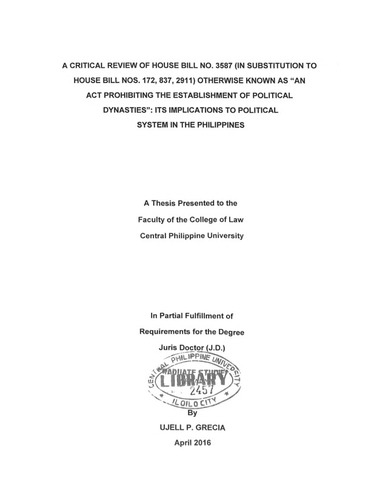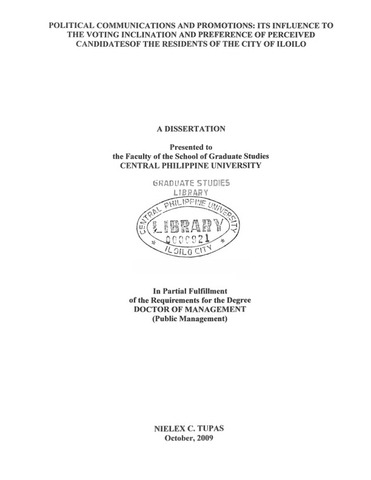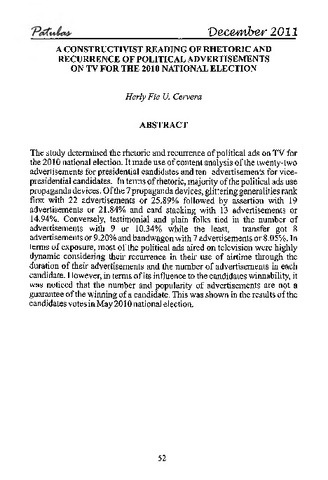A critical review of House Bill No. 3587 (in substitution to House Bill Nos. 172, 837, 2911) otherwise known as “An act prohibiting the establishment of political dynasties”: Its implications to political system in the Philippines
요약
This study was conducted to review House Bill No. 3587 “An act prohibiting the establishment of political dynasties in the Philippines” and determine its implications to political system in the Philippines. The study included the determination of vague and ambiguous provisions of the said bill and advantages and disadvantages of political dynasty in the Philippines.
In this study, qualitative research was used. Hence, the researcher focused on the interpretation rather than quantification. The type of qualitative research used is Grounded Theory. It is a research approach in which the theory is developed from the data, rather than the other way around. Data collection and analysis were consciously combined, and initial data analysis was used to shape continuing data collection.
The data was gathered primarily from House Bill No. 3587 through a critique analysis of its provision to determine the vague and ambiguous provisions in the said bill. After the critical review of House Bill No. 3587, other data were gathered through books, journal and other related studies conducted to determine the implications of said bill to the political system in the Philippines regarding its provisions.
The data was analyzed primarily by conducting a critical review of the provisions of House Bill No. 3587. Each provision was analyzed based on the words written and interpretation have been made to determine future implications. Vague and ambiguous provisions were determined through critique analysis of the provisions of said bill. Other data gathered were used to determine the effects of House Bill No. 3587 based on the provisions written to the political system in the Philippines. Books, journals and previous studies were analyzed to determine the advantages and disadvantages of political dynasties and the existing political dynasties in the Philippines.
The result of the study conducted determined that Sections 3, 5 and 7 of House Bill No. 3587 are vague and ambiguous provisions. Sections 3 and 5 of said bill include common law wife or husband in the term “spouse” which is covered by the prohibition under Section 5 of said bill despite the absence of valid marriage under the Philippine law. Also, Section 7 of said bill is vague and ambiguous because it lacks of specific procedure for application and prohibition. The said provision provides that “any citizen of voting age may file a verified petition” which is vague for the reason that it may be applied both to natural-born or naturalized citizen. Further, said provision provides that any citizen may file a petition which is clear that even a non-registered voters may file despite the lack of legal standing to sue.
House Bill No. 3587 would prohibit political dynasty within second degree of consanguinity or affinity, whether legitimate or illegitimate, full or half blood, to an incumbent elective official seeking re-election shall be allowed to hold or run for any local or national elective office in the same election. Said bill would eliminate political families but not completely because the prohibition under section 5 of said bill does not cover relationship within fourth civil degree of consanguinity of affinity. Further, political dynasty in barangay elections will still exist because it is not covered by the prohibition.
기술
Abstract only
추천 인용
Grecia, U. P. (2016). A critical review of Hose Bill No. 3587 (in substitution to House Bill nos. 172, 837, 2911) otherwise
known as “An act prohibiting the establishment of political dynasties”: Its implications to political system in the
Philippines (Unpublished postgraduate thesis). Central Philippine University, Jaro, Iloilo City.
유형
Thesis학과
College of Law정도
Juris Doctor선반 위치
GSL Theses 340.72 G799
물리적 설명
ii, 54 leaves
Collections
- Juris Doctor [144]
Related items
Showing items related by title, author, creator and subject.
-
An analysis of presidential candidates’ Facebook posts during the 2022 Philippine National Election
Palcullo, Vince Ervin V. (Faculty of Arts, Chulalongkorn University, 2023)The 2022 Philippine National Election witnessed a significant shift in political communications and campaigning strategies due to the utilization of Facebook. Utilizing the Facebook posts of Ferdinand “Bongbong” Marcos, ... -
Political communications and promotions: Its influence to the voting inclination and preference of perceived candidates of the residents of the city of Iloilo
Tupas, Nielex C. (2009)This study aimed to determine the extent of influence of political communication and promotions to the voting inclination and preference of candidates. The research is descriptive-relational as it describes certain ... -
A constructivist reading of rhetoric and recurrence of political advertisements on TV for the 2010 national election
Cervera, Herly Fie U. (Central Philippine University, 2011-12)The study determined the rhetoric and recurrence of political ads on TV for the 2010 national election. It made use of content analysis of the twenty-two advertisements for presidential candidates and ten advertisements ...





